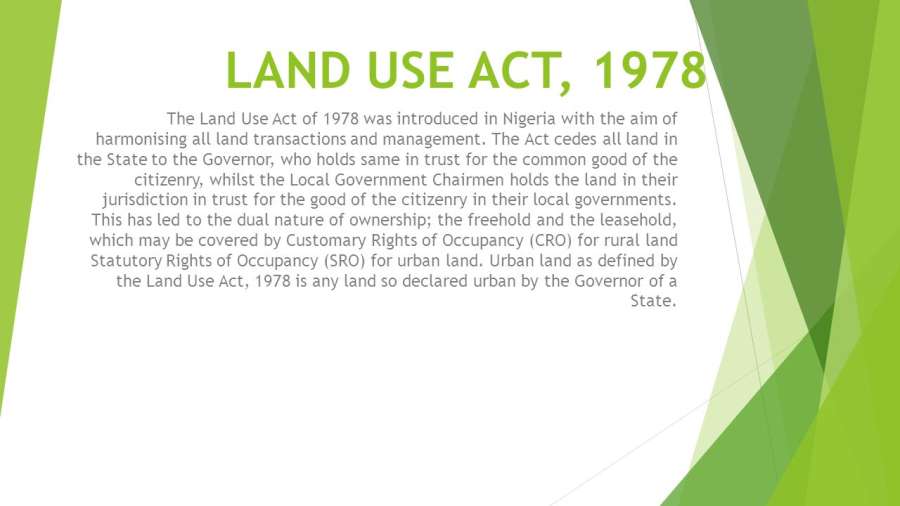Land Reforms , Land Use Act in Nigeria

Human society the world over is heavily dependent on land and its resources. It is not an overstatement to say that without land, there will be no human existence.
It is the foundation of shelter, food, and employment. Man lives on it during his life and upon his demise, his remains are kept in it permanently.
From the foregoing, it is obvious that the life of man and that of the society revolve around it and its resources. Thus, it is understood that man’s fulfillment of his potentials in life depends largely on his relationship with it.
Global recognition of its relevance to the life of man can be gleaned from the proceedings at the United Nations Conference on Human Settlement (Habitat II) 1996 where many countries committed themselves to promoting optimal use of its productivity in urban and rural areas and protecting fragile ecosystems and environmentally vulnerable areas from the negative impacts of human settlements, inter alia, through developing and supporting the implementation of improved land management practices that deal comprehensively with potentially competing land requirements for agriculture, industry, transport, urban development, green space, protected areas and other vital needs.
It is its importance to man and the society that influenced the state intrusion into property legislation in order to ensure adequate and efficient land management technique for the benefits of the greatest number of the members of the society.
Virtually every form of investment or development by government and private entities is dependent upon theland in one way or another. It is now generally accepted that poor land administration can impede economic development and social welfare.
Therefore, no nation can fold its arms and allow its management to fall in disarray as “no nation handles the issue of land management within its borders with levity”.
It is this nexus between land and economic prosperity of an individual and a nation that probably informed the Constitutional provision respecting the inviolability of private property rights in various jurisdictions around the world.
In Nigeria, the provision of section 43 of the Constitution stipulates that no right or interest in movable or immovable property shall be compulsorily acquired anywhere in Nigeria without the payment of adequate compensation.
Thus, while the Constitution recognizes the importance of land to personal economic growth by preserving individual property rights; it also recognizes the eminent domain status of the state to take private property upon the payment of adequate compensation to the victim.
It is therefore imperative that the state should endeavor to strike an equitable balance between private property rights and state rights to compulsorily acquire private lands for public good. This balancing posture is to ensure that land, the scarce and limited resources of the nation is put to an optimal judicious use.
The Land Use Act, 1978 was enacted to address its to mankind; and therefore provide viable management options to land administration in Nigeria.
With the present precarious situation in land administration in Nigeria, the Government needs to take a stand and take steps to review the current legal regime.
To be continued next week










